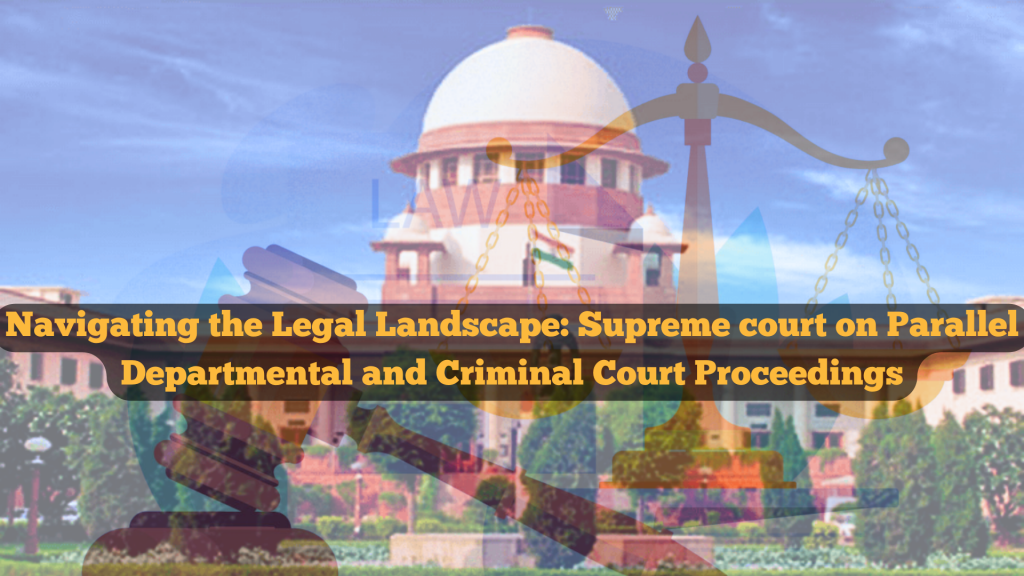
Navigating The Legal Landscape : Supreme Court On Parallel Departmental And Criminal Court Proceedings
Judgement Given On : 08/04/2019
In the realm of law, the interplay between departmental proceedings and criminal court cases has often been a complex matter. The Supreme Court of India, in the case of The Secretary, Lucy Sequeira Trust And Anr. v. Kailash Ramesh Tandel, addressed the critical question of whether the initiation of departmental proceedings could amount to contempt of court when criminal proceedings are concurrently underway. This case was unfolded before the bench of Hon’ble Mr. Justice U.U. Lalit and Hon’ble Ms. Justice Indira Banerjee, leading to significant clarifications on the matter.
Kailash Ramesh Tandel, the respondent in this case, was employed as an assistant teacher in a school administered by the Secretary, Lucy Sequeira Trust And Anr., the appellant. Troubles began when a student filed a written complaint and a First Information Report (FIR) against Tandel, accusing him of an offense under Section 509 of the Indian Penal Code (IPC). Another complaint, this time from a different student, resulted in an FIR under Section 354(a) of IPC and Sections 9(f), 10, and 11 of the Protection of Children from Sexual Offences Act, 2012 (POCSO).
In response to these allegations, the school suspended Tandel pending inquiry. An Inquiry Committee was constituted by the appellant, comprising the Convener (nominee of the appellant), a nominee of the respondent, and a State Awardee Teacher (an independent member). Following a detailed inquiry, the Convener recommended the termination of Tandel’s employment. However, the nominee of the respondent and the State Awardee Teacher (referred to as “Dissenting Members”) refused to sign the report, expressing concerns that the departmental proceedings might amount to contempt of court given the concurrent criminal proceedings.
Despite the Dissenting Members’ reservations, the appellant passed a resolution terminating Tandel’s service. In response, Tandel appealed his termination under Section 9 of the Maharashtra Employees of Private Schools Act, 1977. The School Tribunal, Mumbai, remanded the matter for fresh consideration before the Committee, as the Dissenting Members had not provided a firm decision and believed that proceeding with the inquiry would constitute contempt of court. This decision was influenced by a previous Supreme Court ruling suggesting that in cases of faulty inquiries, matters should be remitted to the disciplinary authority to address the identified issues.
Legal Arguments:
The appellant’s legal counsel argued that the serious nature of the charges against Tandel, especially considering that they involved minor students, justified the immediate initiation of departmental proceedings. They contended that the Dissenting Members’ approach was incorrect as their lack of conclusive findings allowed the management to make a transparent decision consistent with the Convener’s findings.
In response, Tandel’s legal representative highlighted the impartiality of the State Awardee Teacher, emphasizing that the inquiry should await the conclusion of the criminal cases against Tandel. They argued that the management’s decision to terminate Tandel was unjustified.
Legal Analysis:
The Supreme Court’s analysis delved into the fundamental differences between departmental proceedings and criminal court cases. The Court emphasized that these two processes serve distinct purposes, require varying standards of proof, and adopt different approaches. Importantly, the initiation of departmental proceedings, even in cases involving charges of sexual harassment, cannot be construed as contempt of court when criminal proceedings are concurrently ongoing.
The Court acknowledged that criminal investigations had been conducted, chargesheets filed, and allegations sustained during police investigations in both FIRs against Tandel. These findings indicated that Tandel faced credible accusations in the criminal context. The Court underlined that the allegations of sexual harassment against Tandel were grave, involving the safety and well-being of adolescent girls.
Crucially, the Court observed, “It is well settled that a departmental proceeding and proceedings in a criminal court are completely different. The purpose is different, the standard of proof is different, and the approach is also different. The initiation of the process in a departmental proceeding, especially on charges with which we are concerned in the present matter can never be said to be amounting to contempt of court even if the criminal proceedings were pending.”
The Court firmly asserted that departmental proceedings must be independent and proactive, particularly when allegations of sexual harassment against minors are involved. Whether criminal trials are pending or not should not influence the pursuit of justice through departmental channels. The Court rebuked the Dissenting Members’ perspective, emphasizing that their approach was untenable.
Court’s Decision:
In its final verdict, the Supreme Court concluded that the appellant had acted judiciously in initiating departmental proceedings against Tandel. The Dissenting Members’ reluctance to provide a clear decision allowed the appellant to rely on the Convener’s conclusions, leading to Tandel’s termination. The Court commended the appellant’s fair and transparent approach, taking into account the gravity of the allegations of sexual harassment involving adolescent girls.
The decision set a significant precedent, clarifying that departmental proceedings must remain independent, especially in cases of alleged sexual harassment. This ruling underscored that such proceedings should proceed expeditiously, irrespective of the pendency of criminal trials. The Court’s approach emphasized the importance of safeguarding the rights and well-being of vulnerable individuals, particularly when serious allegations are at play.
This case provides valuable insights into the intricate relationship between departmental and criminal court proceedings. It serves as a reminder that these processes serve distinct purposes and should not hinder each other’s progress. When allegations of sexual harassment, particularly those involving minors, are at the forefront, the pursuit of justice should remain transparent, independent, and unwavering.
This judgment by the Supreme Court reinforces the importance of maintaining the integrity of departmental proceedings while simultaneously recognizing the gravity of the allegations. It serves as a guiding beacon for future cases involving parallel proceedings, ensuring that the pursuit of justice remains resolute, regardless of the legal avenues chosen.
